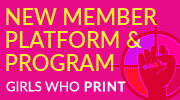
Remember the last time you told a customer their idea was bad? Did you hesitate? Maybe you didn’t want to lose the job. Maybe you wanted to avoid an uncomfortable discussion. Maybe your customer just really, really wanted to do it his way?
This is indeed an awkward situation.
We justify it by thinking, “It’s not THAT bad” or “It might turn out better this time.” We even say, “Who am I to judge? We’re all entitled to our personal tastes.”
Remember, we are the experts.
What if your attorney said, “Sure, we can do it your way.” Later you found out it cost thousands of additional dollars and made you vulnerable to a lawsuit. Would you fire him or her? Of course you would. It’s your attorney’s job to be the expert.
Yet we’re often willing to let customers lead the way when, in fact, we’re the ones with the experience.
Why do we back off?
I’ve heard people say that printers and designers don’t have the confidence to tell a customer the truth. Baloney. We’re not “afraid” of our customers. I do think we are busy, and it can be easier to let customers have their own way. Also, we let our sympathy get in the way. We know what it’s like to spend time on a project and start over from scratch.
The main issue, though, is that we don’t have a systematic way to tell customers their ideas are bad.
Be prepared with the right phrase.
Have the wording ready to go. Write it down. Practice. Don’t wing it or you WILL piss someone off.
Here are some phrases that can work:
- “In our experience, that type of campaign will not get the results you need.”
- “Over the years we’ve seen poor results with this approach.”
- “We do not recommend this type of campaign to our customers.”
Refer to the campaign or project — don’t say “your” idea. Make it impersonal: don’t attack the customer.
Be prepared to follow up with something better.
When you offer an alternate idea, this is the time to personalize the word choice:
- “You’ll see better results if you…”
- “Your response rate will go up if you…”
- “You’ll have better success if you…”
Be prepared to be righteous.
If you look out for the best interests of your customers, they’ll be less likely to be upset. This is when you use the “I” word:
- “I wouldn’t be doing my job if I didn’t offer a better way to achieve your goals.”
- “I can’t in good conscience support a project that will not achieve the best results.”
- “I see you are attached to your project, but I’m looking out for you.”
Be prepared to go out on a limb.
Printers and designers worry because they think, “What if I recommend an alternate idea that’s not a success? The customer will blame me!”
Yes, your alternate idea may crash and burn. However, if you’ve built your business on the quality of your work and the power of your word, you’re more likely to impress a customer if you go to bat for them. Set the bar high and encourage your customers to aim high as well.
When it’s time to have a difficult conversation with a customer, prepare in advance with diplomatic phrases, have a better idea ready, and have your customer’s best interests at heart. Remember, your customer’s success is your success!
 Sandy Hubbard is a marketing strategist for print and media companies that are going through extreme change or growth. She builds marketing programs that can be sustained over the long haul, with affordable tools…and without stress! Find Sandy on Twitter at @sandyhubbard each Wednesday at 4 pm ET, assisting #PrintChat host Deborah Corn @PrintMediaCentr with a lively online discussion for printers and those who love print.
Sandy Hubbard is a marketing strategist for print and media companies that are going through extreme change or growth. She builds marketing programs that can be sustained over the long haul, with affordable tools…and without stress! Find Sandy on Twitter at @sandyhubbard each Wednesday at 4 pm ET, assisting #PrintChat host Deborah Corn @PrintMediaCentr with a lively online discussion for printers and those who love print.













5 Responses
You had me at: What if your attorney said, “Sure, we can do it your way.” Later you found out it cost thousands of additional dollars and made you vulnerable to a lawsuit. Would you fire him or her? Of course you would. It’s your attorney’s job to be the expert.
I guess I just find it hard to be authoritative when it’s the customers money, but you are absolutely right! I need to start taking my own views more seriously I guess.
Thanks @LukeB4 – If you’re an ongoing resource and speak with diplomacy, you’ll attract the right kind of customers who will appreciate your expertise. Thank you for your feedback!
Well done Sandy (always)…
Can’t wait for the sequel “How do you tell your expert their ideas are bad” lol
johnkyp Not a bad idea! 🙂
This post reminds me of the Challenger Sales process which is defined by the ability to teach, tailor, and take control. The key is to do this with diplomacy, and empathy. Ask them what their trying to achieve and get them to explain how their strategy accomplishes the goal. If it’s really a bad idea they’ll probably reach this conclusion which is part of the learning process. From there you can tailor your message with new information and at that point you’ve taken control with enough empathy diplomacy that you don’t end up sounding like an ass…